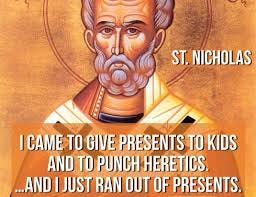Hi friends, here are the six things I wish everyone knew about Christmas!
1. Christmas is not based on the pagan festival of Saturnalia.
The calculation for Christmas went like this. According to tradition, Jesus was crucified on 25 March AD 30. They assumed that the annunciation to Mary, where Jesus was miraculously conceived by the Holy Spirit, happened on the same date thirty years earlier, so 25 March 1 AD. So, if you add nine months to 25 March then you get 25 December! The fact that it coincides with the festival of Saturnalia or any other pagan festival is a coincidence.

2. The holy family did not struggle to find a hotel to stay at.
The holy family was in an animal husbandry area when Jesus was born, not because there was no room at the “inn,” but because there was no room in the “guest room.” This is why the latest version of the NIV reads: “She wrapped him in cloths and placed him in a manger, because there was no guest room available for them” (Luke 2:7).

3. Xmas is not a secularizing of Christ’s name.
In ancient manuscripts, certain sacred names could be abbreviated so that God/Theos was TS, Jesus/Iesous was IS, and Christ/Christos was XS. So changing “Christmas” to “Xmas” is not taking Christ out of Christmas, it is using the Christian scribal tradition of turning Christ’s name into a nomina sacra, a sacred name.
4. Isaiah 7:14 is not a messianic prophecy, but is a typology.
Matthew 1:23 quotes Isaiah 7:14: “The virgin will conceive and give birth to a son, and they will call him Immanuel.” If you read Isaiah 7, the Hebrew word almah means a woman of marriageable age not a technical virgin. Even so, the Septuagintal translation of Isaiah 7:14 with the Greek word parthenos, which does normally mean virgin, arguably obscured things. In the context of Isaiah, the birth of the child is a sign to Hezekiah, that Jerusalem will survive the Assyrian siege. Matthew takes that up, not as a prophecy, but as a type, a pattern that is rehearsed in a new phase of redemptive-history where a child born is again a sign of God’s promise to save his people. Perhaps the difference is that the ruler veneration of a child being called “Immanuel” moves from regal rhetoric to revelational reality with the birth of Jesus.

5. Did St. Nicholas slap Arius - No!
According to tradition, bishop Nicholas of Myra slapped the heretic Arius at the Council of Nicea. That didn’t happen because Arius did not attend the council. Sadly debunking my favourite Christmas meme.
6. The Christmas feast begins on 25 December and ends on 6 January.
In 2024, Advents runs from 1 Dec to 24 Dec, but the Christmas festival itself runs until 6 January. So keep your Christmas trees up until then!







Of course you've missed out the really controversial issue of the tree, not when does the tree get taken down but when it should be put up in the first place!
I am interested by Isaiah 7:14 not being a messianic prophecy, but being a typology. This makes perfect sense (and makes nonsense of the 'translation wars' over virgin/young woman.) Is there any reference that lists other well known prophecies that are actually typologies?